Top 12 Reasons Why Muhammad Ali Is Forever “The Greatest”
Yesterday was the anniversary of the birth of Muhammad Ali, the man who changed boxing forever and, as we must each year, we take time to celebrate his life and career. Muhammad Ali’s death in 2016 caused the entire pugilistic world to stop and reflect upon the far-reaching legacy of a fighter who was truly bigger than boxing. Without a doubt, Muhammad Ali will forever stand as one of the most influential and famous figures in the entire history of sport.
For those not entirely clear as to why Ali commands such respect and meant so much to so many, consider this list a sort of primer on the greatness of the man they call “The Greatest.” There has never been, and likely never will be, an athlete like Muhammad Ali. He was a truly great boxer but he was also a truly important world figure. Here are the reasons why he assumed such magnitude and had a profound impact on both boxing and the culture at large.
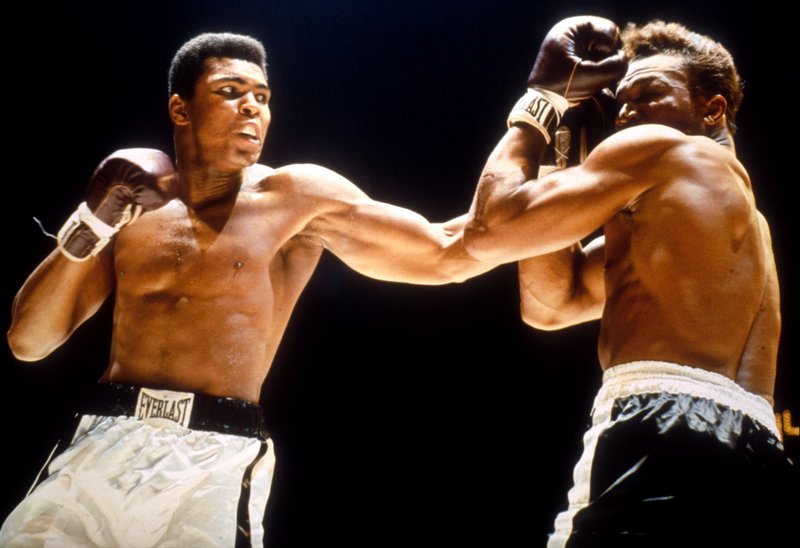
12. A Fighting Champion: Unlike so many elite-level boxers of today, Muhammad Ali wanted to establish himself as a truly great boxer and he knew to do so meant staying active. To put his activity level into perspective, consider that in the span of five years, 1970 to ’75, he answered the bell twenty-two times, in the process giving sports fans his trilogy with Joe Frazier, two tough battles with Ken Norton, his unforgettable knockout over George Foreman, and wins over a host of elite-level contenders including Jerry Quarry, Oscar Bonavena, Jimmy Ellis, George Chuvalo and Ron Lyle. Meanwhile, from 2010 to 2015, Wladimir Klitschko competed twelve times; Floyd Mayweather just nine. (Ed. note: To further keep this in perspective, guys like Harry Greb and Henry Armstrong fought more than twenty times in a single year.)
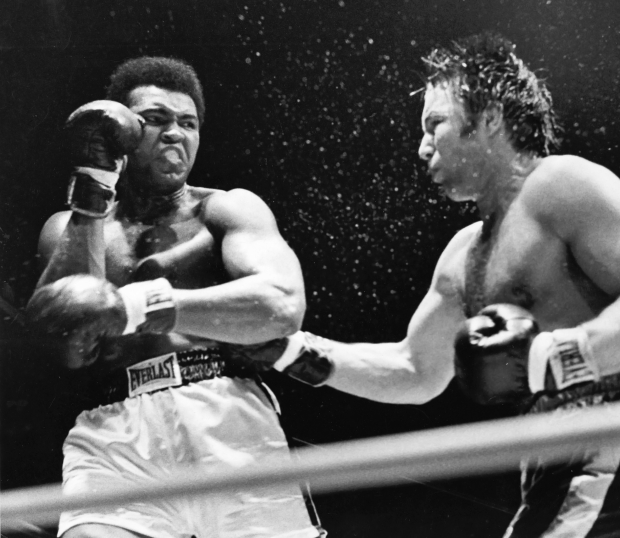
11. Speed: There is little doubt that a prime Ali is the fastest heavyweight to have ever stepped through the ropes. His quickness and mobility was a revelation in the 1960s; big men simply did not move like that. His amazing speed and reflexes allowed him to introduce a level of artistry and elegance to heavyweight boxing which changed the public’s perception of the sport and pioneered new tactics and techniques. Years past his prime, Ali still enjoyed a decided speed advantage over most of his opponents, a testament to his astonishing athleticism.
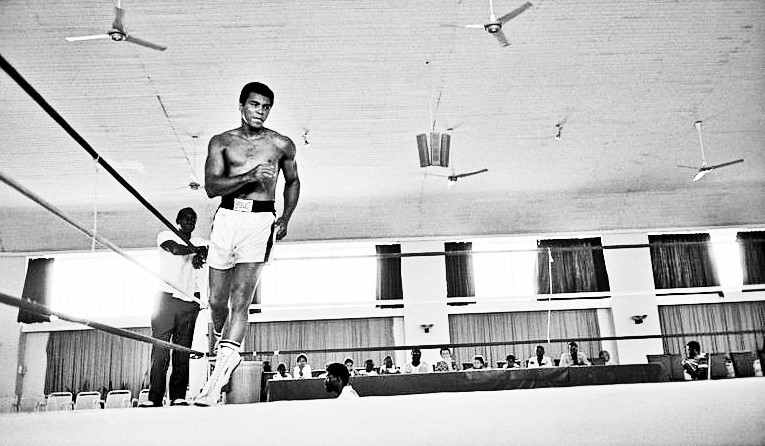
10. Chin: One of the ironies of the career of Muhammad Ali is that for years the old-timers questioned his courage and toughness. They watched him dance and slip punches and concluded if he was ever hit squarely by a serious puncher he would fold up like a cheap suitcase. How wrong they were. In fact, Ali proved too tough for his own good. Precious few boxers in the history of the sport have withstood the kind of firepower Ali took from Frazier, Norton, Foreman, Shavers and Holmes. Ali was knocked down only four times in his career, by Sonny Banks, Henry Cooper, Joe Frazier and Chuck Wepner. And it should be noted the Wepner knockdown was the result of “The Bayonne Bleeder” stepping on Ali’s foot at the moment he landed a right hand to the ribs.

9. A True World Champion: Few boxers have fulfilled the title of “world” champion the way Ali did. Instead of staying moored in one’s home country or in Las Vegas, like so many titlists of recent years, “The Greatest” trekked about the globe, boxing in such diverse locales as Switzerland, Malaysia, Ireland, Japan, Canada, Germany, the Philippines, and of course, Zaire, in the process cementing his status as a figure of global significance.
8. Sonny Liston: Charles “Sonny” Liston was a truly fearsome heavyweight. Incredibly strong and powerful, in 1964 he was regarded as just shy of invincible. An aura of menace surrounded this ex-con and former leg-breaker for the mob, his reputation so dark that many were of the conviction he did not merit the opportunity to fight for the world title, despite the fact he had defeated virtually every viable contender prior to facing champion Floyd Patterson. He then demolished Patterson inside of one round; in the rematch, he did the same.
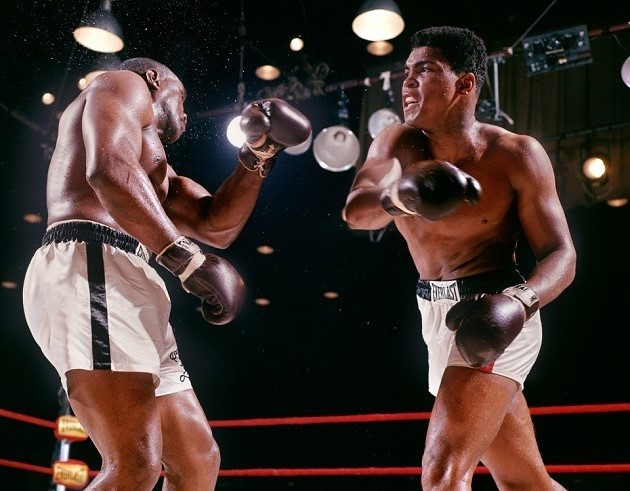
Thus, many were predicting a long and dominant championship reign for Liston and when he agreed to face the undefeated Cassius Clay in his first title defense, virtually every boxing pundit and expert foresaw an easy win for the champion. Instead, despite some underhanded tactics by Liston’s corner which saw Clay temporarily blinded during the match, the brash, young challenger “shook up the world” and completely outclassed Liston, compelling him to quit on his stool after round six.
7. The Return: Elite-level athletes rarely come back after lengthy lay-offs to re-establish themselves as the best of the best. Does anyone think that say Sidney Crosby, or Lebron James, or Tom Brady could sit out three-and-a-half seasons and then just pick up where they left off? Amazingly, after Ali finally won the right to return to boxing, he took on no soft touches, no tune-ups, but instead faced two dangerous top contenders, Jerry Quarry and Oscar Bonavena, and then the champion, Joe Frazier, defeating the first two and giving “Smokin’ Joe” the toughest fight of his career to date.
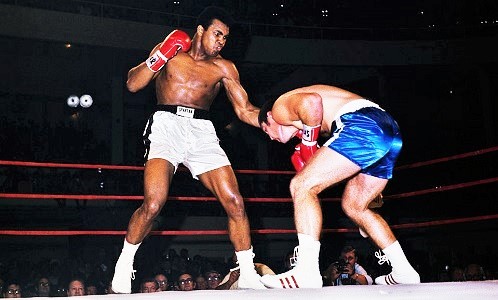
6. The Louisville Lip: Early in his career, Ali witnessed professional wrestler Gorgeous George perform and realized that being loud, brash and boastful attracts attention and sells tickets. Thus, “The Louisville Lip” was born. But the significance of Ali’s rapping and rhyming went beyond stealing the limelight and bringing a renewed focus to the sport of boxing. For a young black man to be so cocky and outspoken in the 1960’s was nothing short of revolutionary, and with the aid of his natural charisma and wit, Ali introduced a whole new dimension to the idea of “Black Pride.” And it must be noted that he did not indulge in mere mindless name-calling and “trash talk” but went out of his way to offer intriguing opinions and insights on a wide range of topics as he recited poetry, quoted verses from the Koran, performed on Broadway and gave speeches at universities.
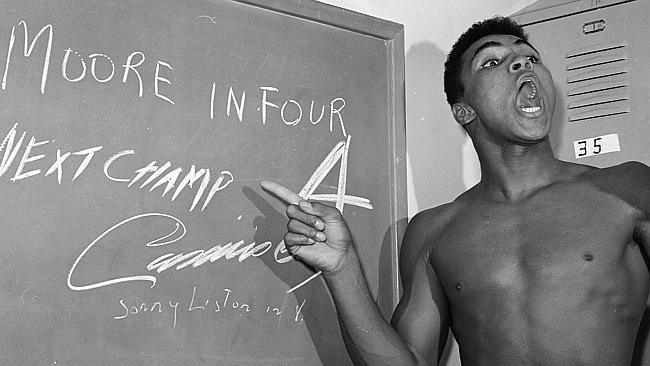
5. Joe Frazier: After Ali had been stripped of his world title and banned from boxing in 1967, it took time for the heavyweight division to find a worthy successor, but by 1970 “Smokin'” Joe Frazier had established himself as one of the most relentless and powerful big men fight fans had ever seen. Like a giant-sized Henry Armstrong, Frazier applied constant pressure, breaking down his opponents with a non-stop attack and maybe the best left hook in boxing history. Ali and Frazier were a study in contrasts while being virtual equals in terms of strength, courage and will to win, all of which made for an unforgettable rivalry. Frazier was victorious in their first great battle in 1971, one of the most significant fights ever and a match which not only transcended boxing, but sports itself; Ali won the next two clashes. Ali’s performances against Frazier in all three meetings are testament to his ring greatness and constitute a huge part of his legacy.
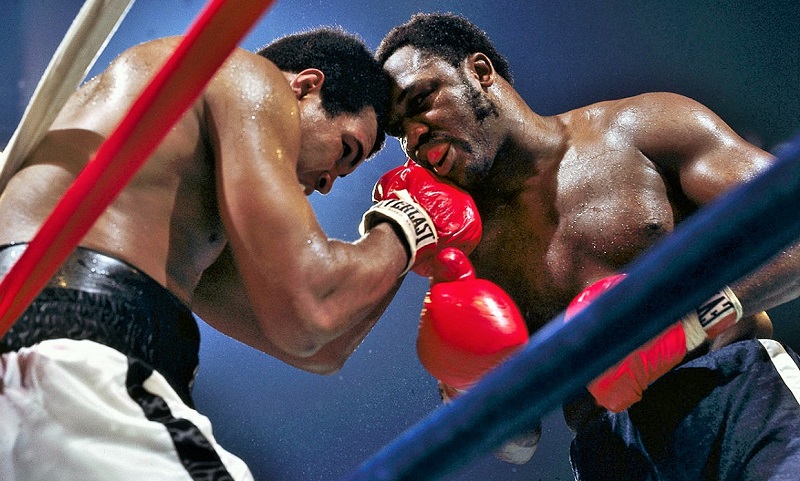
4. An All-Time Great Competitor: When it came to competing, Ali was ‘old-school.’ Which is to say, that while much of what Ali brought to boxing was new and unique, when it came to his chosen profession, Ali was not so different from the great battlers of decades past who loved to fight, loved to win, and wanted to prove themselves against the best competition available. It just so happens that Ali came along during the heavyweight division’s Golden Age; never before or since have their been so many big, tough, capable boxers in that weight class and Ali fought them all. He ducked no one; nor did he “marinate” matches or wait for anyone to get old or stale. Instead, the second someone challenged him or questioned his supremacy, he responded as all truly great competitors do and sought to prove himself again.
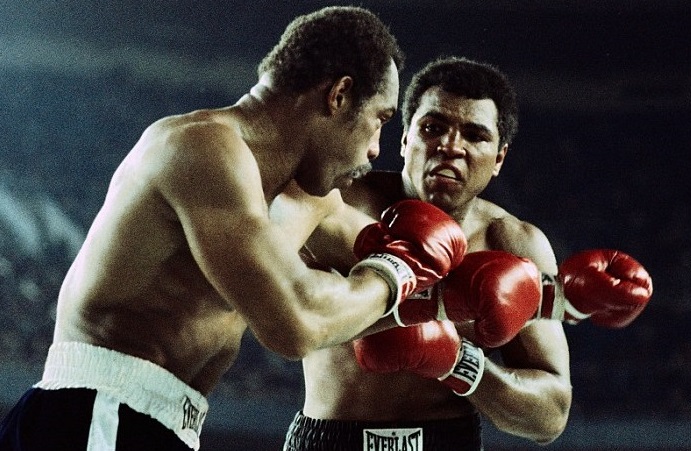
3. George Foreman: There is no doubt about the ring greatness of Big George Foreman. Any sensible ranking of the greatest heavyweight champions of all-time has to put him in the top ten, and in 1974 he was regarded, like Sonny Liston before him, as unbeatable. Boxing insiders knew he was mortal and some gave the cagey Ali a decent chance to pull off a huge upset in 1974, but almost none were picking Muhammad outright, while many fans of “The Greatest” feared for Ali’s life. After all, the two formidable heavyweights who had beaten Ali and given him his toughest fights, Frazier and Norton, had been demolished with ease by George’s fists. How could an ageing Ali defeat a younger, stronger and more powerful opponent? And yet he did. It remains one of the most significant matches in boxing history for both Ali’s performance and its many cultural and political implications. This is the great triumph that transformed Muhammad Ali from a famous boxer and an important figure in the Civil Rights and anti-war movements, to a genuine living legend.
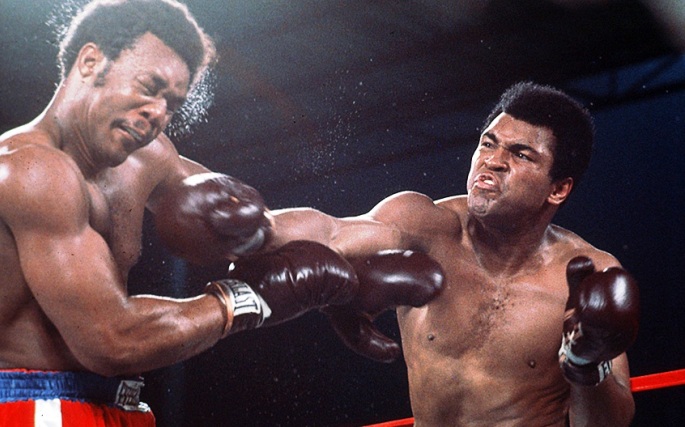
2. Political and Cultural Impact: Books can and have been written on Ali’s influence beyond sports. He was a leading figure during the upheaval of the 1960s in America; a prominent and outspoken critic of American society; an anti-war activist arrested for refusing the draft and denied his right to box during his prime years; a world figure for becoming a Muslim and changing his name. There is no way to overstate the significance of all this. For a young, prominent black man to change his name and religion and loudly proclaim his anti-establishment views in the 1960’s … Well, let’s put it this way: during a time when Martin Luther King, Robert Kennedy, Malcolm X, and Fred Hampton were all assassinated, it’s probably fortunate that Ali too wasn’t murdered. And after his boxing career had ended he continued to be a force for social change as he rejected the dogma of the Black Muslims, advocated for reconciliation and cultural harmony, raised awareness for Parkinson’s disease, and even rescued hostages from Iraq in 1990.
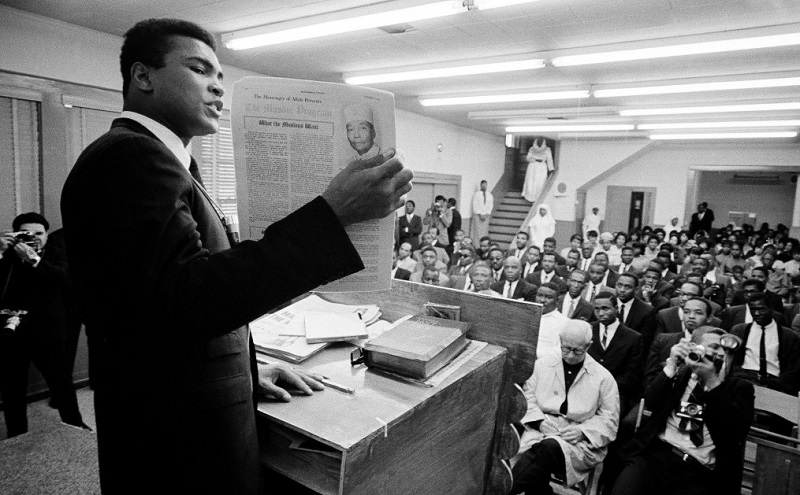
1. A People’s Champion: Finally, the story of Muhammad Ali is that of a man of conviction and faith who was beloved by millions and who in turn loved nothing better in life than connecting with as many of those people as he could. Ali loved people and refused to cut himself off from the press or the public. His training camps were always open to visitors and it was the extremely rare request for an interview that he declined. While Floyd Mayweather Jr. disembarks from his private jets far away from the public and surrounded by a platoon of mammoth goons, even at the height of his fame, Ali only ever employed a single bodyguard and never hesitated from mingling with his admirers wherever he happened to be.
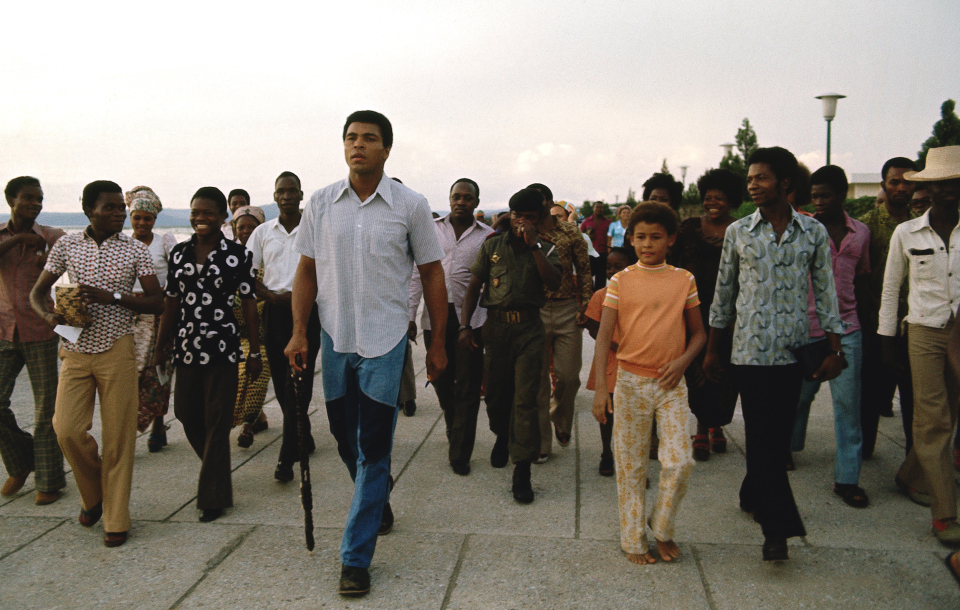
And while boxers today may refrain from discussing their personal lives or avoid making themselves available to the media, Ali did the opposite. He loved answering questions and being challenged by interviewers and held nothing back. His integrity, the fact he stood for something bigger than boxing, along with his openness, sense of humor, and natural charisma, all coalesced with his ring success to make him a superstar. Books, television specials, comics, games, toys, movies, plays, video games; accolades and tributes from people like James Brown, Diana Ross, Madonna, Norman Mailer; honorary degrees from universities and the Presidential Medal of Freedom; a museum and cultural center established in his name in Louisville, Kentucky; the Olympic flame lit by his trembling hand in 1996 — Ali became, and will forever be, larger than life. Yes, boxing was the springboard to all this, but the man’s influence will continue to be about much more than sports. Ali was, and is, the people’s champion, and his legacy will no doubt outlive all of us.
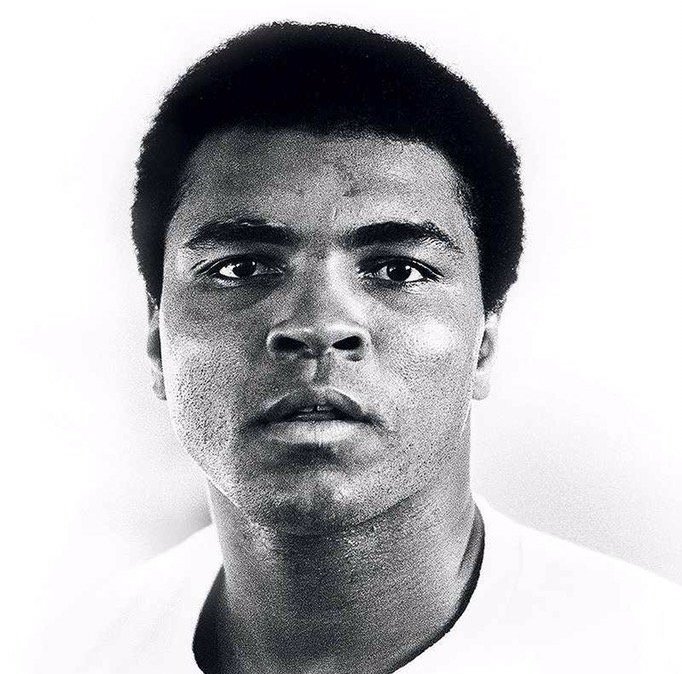

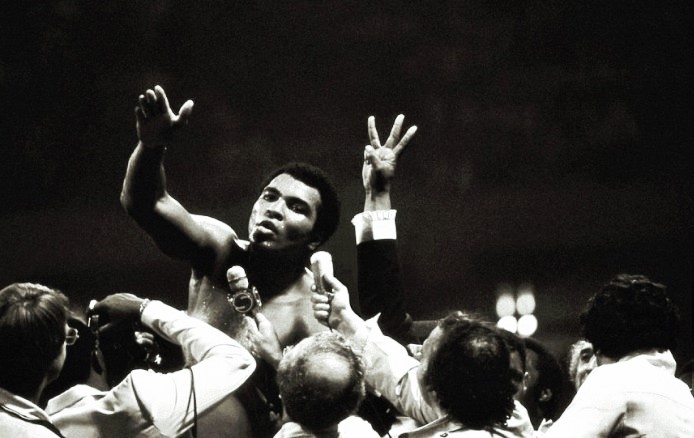

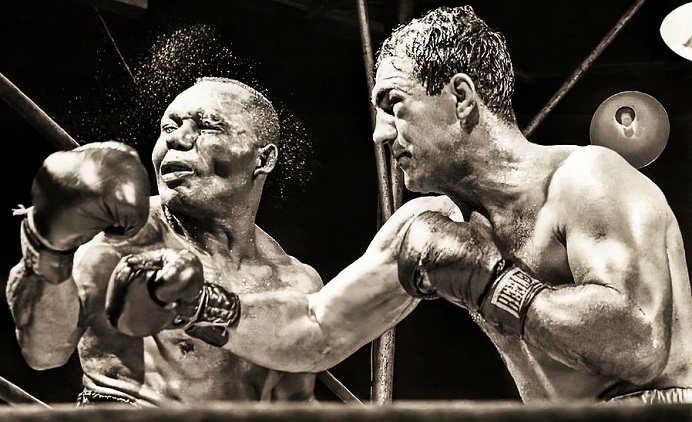
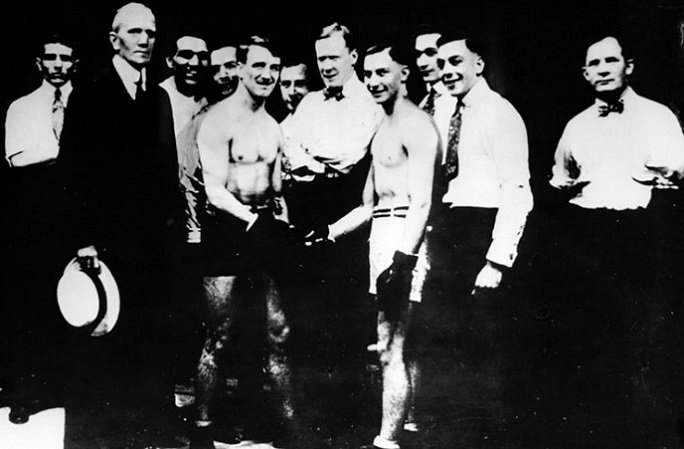
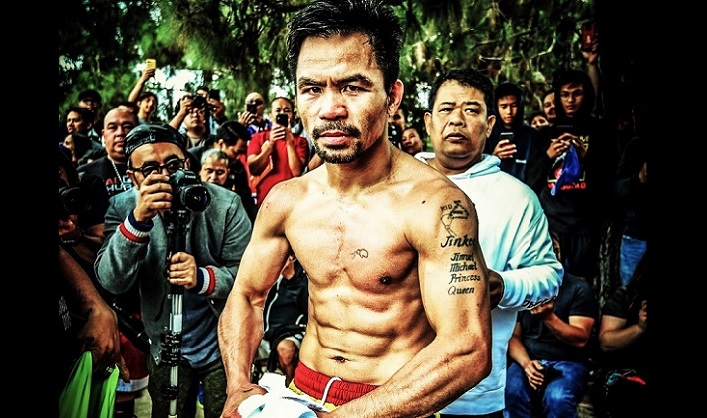
Love the man. He gave pride to his people without taking anything away from others. And he was a hero to every young kid.
Indeed he did and indeed he was
You’re right.
Muhammad Ali was a good man and a world figure. He stayed strong for three-and-a-half years, told the government “I’m standing up for what I believe in.” There will never be another Muhammad Ali.
I agree: Muhammad Ali was one of the finest athletes I have ever had the pleasure to watch. He stood behind everything he said and I miss him immensely. What an honor it was to watch his fights. I still go to Youtube today and watch him. He will be missed forever.
You’re right.
Muhammad Ali is no doubt the greatest boxer that ever lived. He was a complete athlete and was second to no one. He was very intelligent and brave, and he loved his people. He was “The Greatest”.
He was one of my heroes
I diagree that Ali was great… He lacked a body attack or inside game… He clinched and wrestled a record number of times in the first round with Foreman.. 20 times.. Ali ducked the best.. He avoided Larry Holmes and fought novice Leon Spinks instead.. He got his ass kicked 5 times and didn’t fight for as many years as Mayweather or go undefeated like Mayweather.. Ali was slow — and that’s why he was hit so much and damaged so badly.
You are nothing but a jealous and narrow minded man
Ali winning the Golden Gloves, Olympic Gold medal for the USA, heavyweight championship three times, plus twenty-two successful title fights makes him the greatest. Name me one heavyweight boxer who has done better.
Boxing is like life. No one is “perfect” but name another fighter who had to face guys like Frazier, Shavers, Foreman, Liston, Lyle. Those guys could really hit, but he beat them. He fought when the heavyweight division was at it best. Name me another fighter who could have beaten all those guys.
There is none
Anyone reading Bob Garrett’s answers should know he has lied about a non-existent boxing career, he never coached, and he has lied about everything he posts.
That is funny. Bob is now on Quora, and he is repeatedly called out there for lying about a non-existent boxing career and coaching career.
He is a loser
And Bob has been banned on other boxing forums for lying and being generally obnoxious.
I think you need a proper sleep ….
Funny – you just insulted all “in fighters” for not being actual “boxers” who can utilize distance. Is it possible that just maybe after careful consideration you should STFU?!
You guys need to chill out, he was just expressing his opinion. He even started it out with “I don’t think”. And it’s not like some of what he said wasn’t true. Cause Ali didn’t go to the body, he was mostly just a head hunter, but lacked serious ko power. And any real combinations, he just flicked his jab. He had all kind of technical flaws. But his reflexes and amazing speed allowed him to get away with all that, he’s probably the only boxer who could pull it off. I don’t know about the ducking Larry Holmes thing though.
Edit: he started it with “I disagree”.
My bad
I always laugh when people say Ali “lacked serious KO power” because he knocked out the guys who did!
37 knockouts in 61 bouts; I’d say that is power enough.
That’s style for you. A very unique boxer who changed the people’s perception of boxing as a brutal sport. Ali was Boxing’s G.O.A.T.
To hell with you, Bob🖕🖕🖕!!!
You’re so ignorant.
The great man fought more number one contenders than anyone else in history.
You are jealous!
Any opinion is fine, but greatness is not measured by how good Ali was in terms of body punching or how much he clinched. It is about something else, which is very well explained in this article. And then there is the question about having some losses on his record, compared with the glowing 50-0 on Mayweather’s. Kudos to Floyd for achieving that, no doubt. But I think that some defeats contribute as much to the legacy of a fighter as a victory. We know how Ali behaved when facing a defeat. We do not know how Mayweather would have behaved.
Yes He’s been well found out on Quora I just never realised it was 4 years ago when you Posted your Comment?
He’s found his way onto You Tube, but he’s not lasted long on YT either, found out yet again.
Similar to here I can tell you with great delight that his deep loathing of Ali & his Legacy have him drowning in negative responses, so hopefully he’s as popular on every Site as he is on Q. YT. TFC.
I can only come to one conclusion, Boob is a TROLL!
Don’t you dare talk badly about Muhammad Ali! He was a great man! He was a role model for millions, including me, and I will not let anyone disrespect him.
Yes, you are right.
You too weak to know strength, style and integrity.
Whoa….easy fella. You’re revealing your bias. Ali, slow? The man was as fast as a welterweight and had the endurance of a marathoner.
You don’t know your history in boxing. Ali fought everyone. He didn’t duck Holmes. He was an old man when they fought in 1980. He had way more fights than Mayweather and he took on all comers.
Ignoramus fanboy. Your comments were out of context. Which boxer did not clinch? He out thought Foreman; I still adore and respect Foreman till today. He fought Larry Holmes ( you need to check your facts) against doctors’ advice when age was not on hos side. Leon Spinks at that time was at his peak, Ali wasn’t. We all knew what happened at the rematch. Sorry about Mayweather, the master picker, and establishment beneficiary. You will have to tell who Mayweather fought, including the pure amateur he added to his wish list! Yes he was slow when he was long past his prime. I am sorry, you showed all the signs of a Fanboy! Pity.
Mayweather? How many elite opponents did Mayweather fought? Ali NEVER chose his opponents. He fought anybody, anywhere and everywhere.
Ali didn’t need a body attack to win. And he didn’t duck the best. In fact, that is how Ali became the undisputed and lineal champ more than once. Holmes was never undisputed champion and he avoided rematches except once, with the not-so-tough Earnie Shavers, who Jerry Quarry, several years earlier, had stopped in just one round. Doing the impossible was Ali’s specialty and he is the only man to KO Foreman in 81 fights. Ali risked it all to win and entertain and make boxing the global sport that it is now and boxers today can thank him for the huge money they get paid.
I agree with everything except the “not so tough” Shavers comment. Earnie Shavers was only the hardest hitting heavyweight in history.
I diagree with you clown..anyone with a brain knows Ali was the G.O.A.T. He wasn’t perfect but there was no one better than him for 2 decades..3-time world champion, 1964-1978..Liston, Cleveland Williams, Frazier, Norton, Foreman were monsters that he defeated..a few defeated him but nobody wins all their fights against this caliber of opponents..
Bob Garret You must be crazy, stupid, and dumb to say some shit like that. Larry Holmes was his sparring partner and when he fought Larry Holmes he was well past his prime. Most intelligent people, including Larry Holmes; know he could not have beat Ali in his prime. Sincerely, Charles E. Evans
Multiple times I’ve seen Boobs name on Platforms, all with the same Topic belittling Muhammad Ali’s Ring Achievements, you Boob are a Troll. I do know from multiple Posts that Hating on Ali is your 1 & only Talking Point. Please just go away for everyone’s peace & sanity!!
Look at the third fight with Ken Norton . He got his A– Kicked but the judges gave him the win
I remember as a kid when Ali knocked out George Foreman, it seemed like time stopped for a minute. No one picked him to win, but Ali said he’d do it and then he did it. He will always be the ultimate representation of a champion. He will always be a hero and The Greatest.
Ali’s greatness as a boxer was only exceeded by his greatness as a man. His name reverberates forever as the definition of legend. Ali bomaye!
I only ever had one problem with the great fighters persona and that is in a racially charged period of US history he chose to call black opponents animal names. I never heard him call a white fighter anything more than a washerwoman. This in itself is a compliment to those who clean our homes and clothes.
Ali was no fool, so it’s possible that he selectively used less-insulting verbage to white opponents because he would have been savaged by the press.
Ali was savaged by the press anyways. I doubt that he really ever cared what the media wrote about him as long as they paid attention to him.
Something special about Ali was that he could talk a lot of trash before a match and he would fight to win, but he never enjoyed injuring an opponent. Consider the Ali vs Foreman match. After Ali delivered the right hand that sent Foreman to the deck, he could have easily followed up with another hard punch while George was on his way down. But Ali never wanted to injure anyone, except in the Ernie Terrell match when he got some sadistic pleasure in punishing Terrell and asking him to repeat his name because he had persisted in calling him “Clay.”
If it weren’t for Ali, Floyd would still be homeless with no money at all.
Ali fought George Foreman only once and never gave a rematch. Frazier was five inches shorter and 35 pounds lighter than Ali. Spinks was also shorter and 30 pounds lighter. How would Ali handle the super-heavyweights now who would be several inches taller and 35 pounds heaver than him? Joe Louis is my pick for the greatest ever.
With his speed and agility, Ali would have beaten Sugar Ray Robinson easily at welterweight. I always said this and always will.
I don’t know when this started but I fight for Ali.
RIP Champ.
He was and will forever be the GOAT.
Never forget Muhammed Ali.
It looks liks the self-hating white liberals are out in full force without any objective analysis, just personal attacks. Typical. Marciano: 49-0. The Greatest.